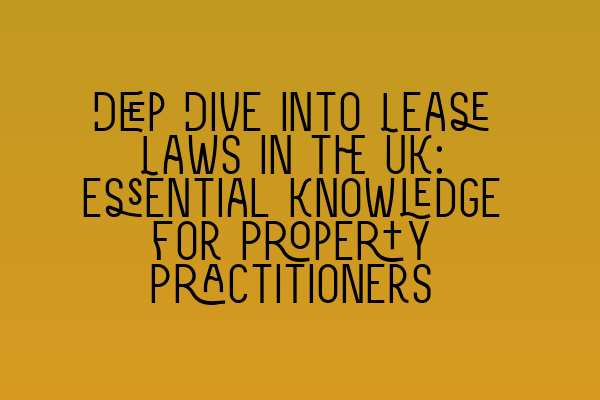Deep Dive into Lease Laws in the UK: Essential Knowledge for Property Practitioners
As a property practitioner, it is crucial to have a strong understanding of lease laws in the UK. Leases are at the core of property transactions and play a significant role in the rights and responsibilities of both landlords and tenants. This blog post will provide you with an in-depth overview of lease laws, covering key concepts, legal requirements, and vital information that every property practitioner should be familiar with.
What is a Lease?
A lease is a legal document that outlines the terms and conditions of a tenancy agreement between a landlord and a tenant. It establishes the rights and obligations of both parties, including rent payments, length of tenancy, repairs and maintenance, and other important provisions. Understanding the intricacies of lease agreements is essential for property practitioners to ensure compliance with the law and provide accurate advice to their clients.
Types of Leases
There are various types of leases in the UK, including:
- Assured Shorthold Tenancy (AST): This is the most common type of residential tenancy in the UK. ASTs provide a landlord with the right to repossess the property after a fixed term, typically six months or a year, as long as they follow proper legal procedures.
- Business Lease: Business leases are used for commercial properties and typically have longer terms. They often include options for rent reviews and other special conditions that cater to the needs of commercial tenants.
- Ground Lease: Ground leases are common in the context of leasehold properties, where the tenant leases the land from the freeholder for an extended period. This type of lease is often associated with long-term residential developments or commercial projects.
These are just a few examples, and each type of lease comes with its unique requirements and considerations. Property practitioners must be familiar with these distinctions when advising their clients on lease-related matters.
Essential Lease Terms
Lease agreements include specific terms that define the relationship between landlords and tenants. Some essential lease terms include:
- Rent: The lease should clearly state the amount of rent to be paid, the frequency of payments, and any provisions for rent increases over time.
- Term: The term of the lease refers to the duration of the tenancy. It is essential to specify the start and end dates to avoid ambiguity.
- Repairs and Maintenance: The lease must allocate responsibilities for repairs and maintenance between the landlord and tenant. This includes outlining who is responsible for specific repairs and establishing procedures for reporting and addressing maintenance issues.
- Use of Property: The lease should detail the permitted use of the property and any restrictions or limitations on the tenant’s activities.
- Break Clause: Some leases may include a break clause, which allows either party to terminate the tenancy before the end of the fixed term.
These are just a few examples of essential lease terms. The specific terms included in a lease will depend on the type of tenancy and the agreement reached between the landlord and tenant.
Legal Requirements for Leases
There are legal requirements that must be met for a lease to be valid and enforceable. This includes:
- Consent to Lease: The landlord must have the legal authority to lease the property, whether it be as the freeholder or with the freeholder’s consent (in the case of leasehold properties).
- Compliance with Statutory Obligations: Landlords must fulfill various statutory obligations, including providing the tenant with necessary documents such as an Energy Performance Certificate, Gas Safety Certificate, and Prescribed Information regarding the tenancy deposit.
- Fair Terms: Lease terms must be fair and reasonable to both parties and cannot include any unfair clauses that infringe upon the tenant’s rights.
- Tenancy Deposit Protection: In most cases, landlords must protect the tenant’s deposit in a government-approved scheme and provide the tenant with specific information regarding the protection.
It is essential for property practitioners to be well-versed in these legal requirements to ensure their clients’ leases are compliant and enforceable.
Resolving Lease Disputes
Lease disputes are not uncommon, and it is essential for property practitioners to have a solid understanding of the mechanisms available for resolving such disputes. Some common methods of resolving lease disputes include negotiation, mediation, and, if necessary, litigation through the courts.
When faced with a lease dispute, property practitioners can provide valuable advice and guidance to their clients, helping them navigate through complex legal processes and protect their rights.
Staying Up to Date with Lease Laws
Given the complexities of lease laws and their constant evolution, it is crucial for property practitioners to stay up to date with the latest developments. Continuing professional development (CPD) courses, such as those provided by SQE Property Law & Land Law, offer an excellent opportunity to enhance your knowledge and stay current with the ever-changing legal landscape.
By investing in your professional development and expanding your knowledge of lease laws, you can ensure that you are providing the best possible service to your clients and positioning yourself as a trusted expert in the field.
To access SQE practice exam questions and practice mocks for SQE 1, visit SQE 1 Practice Exam Questions and SQE 1 Practice Mocks FLK1 FLK2.
To explore SQE 2 preparation courses, visit SQE 2 Preparation Courses, and for SQE 1 preparation courses, visit SQE 1 Preparation Courses.
To stay informed about SRA SQE exam dates, refer to the official SRA SQE Exam Dates page.
By making use of these resources and continually expanding your knowledge, you can ensure that you are well-equipped to handle the complexities of lease laws and provide valuable guidance to your clients.
